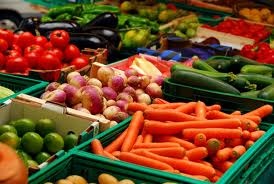
Ghana, a net exporter of food items some few years back, is now a net importer of food items that can easily be produced in the country.
Most of the daily consumables – such as orange, onion, tomato, plantain, toothpick, carrot, garlic, garden egg, okro, cabbage, ginger, and ‘kontomire’ – are imported into the country.
‘Sorkodua,’ those tiny pieces of sticks that serve either as supplement or replacement for your toothpaste and toothbrush, are now imported from Cote d'Ivoire and Liberia; onions from Niger; tomatoes from Burkina Faso; garlic from China; cabbage from Togo; carrots from Togo and Holland, ‘kontomire’ and ginger from Togo; plantain from Cote d'Ivoire; and oranges from Egypt.
Ironically, some of these countries are near-desert conditions and yet they are the ones that are now feeding Ghana, a country blessed with arable lands.
The importation has become so pervasive that the External Trade Statistics of Ghana show that large sums of money are spent each year on importing vegetables.
A visit to various markets in Accra by Weekend Finder reporters revealed that these imported vegetables are on sale in large quantities.
The Economic Community of West African States (ECOWAS) trade laws do not restrict agricultural products crossing borders, making it cheap for buyers to purchase abroad.
A trader at Agbogbloshie market in Accra, who gave her name as Maa Tina, confirmed that market women import the above-mentioned vegetables.
According to her, the importation of these vegetables is as a result of the shortage that they normally face during the dry season.
Maa Tina, who is also a trader in tomatoes, explained that she gets her produce from the northern part of the country.
According to her, during the dry season, Ghanaian farmers are unable to produce tomatoes, leaving traders with no choice other than to resort to the importation of the commodity.
The traders also noted that most consumers prefer to purchase onions from Niger due to the size, which are bigger than onions grown in Ghana.
Garlic from China, they say, come in bigger sizes and are often cheaper compared to locally produced ones.
Most traders confirmed that cabbage and carrots are normally imported from Togo. According to these traders, imported cabbage and carrots have longer lifespan than locally produced ones and are largely patronised by consumers.
"Burkina tomatoes are bigger, harder, far superior in taste and last longer in storage,” one trader said.
Ghana produces 510,000 metric tonnes of tomatoes each year while it imports up to 84,000 metric tonnes a year from neighbours, along with 27,000mt of processed tomatoes from Europe each year, according to the Ghana National Tomato Producers Federation.
The union has been pushing the government to research a high-yield, high-quality tomato variety suitable for the local and export market.
The tomato growers’ federation has called on the government to temporarily ban tomato imports from neighbouring countries, but such a move would transgress ECOWAS trade policy.
Onion importation
Mr Haruna Ageshika, Secretary General of the Ghana Agricultural Producers and Traders Organisation (GAPTO), said about $5 million is lost annually from the importation of onions from Niger and Burkina Faso to Ghana, which can be produced locally.
He said there are favourable conditions in the country for large-scale production of onion, both for local consumption and export.
He said data collected by the organisation in a project supported by the United States Agency for International Development (USAID) and the Agriculture Business and Trade Promotion in West Africa (ATP) in two markets in Accra and Kumasi showed that Ghana imported about $120 million worth of the produce in 2010 and 2011, which was about 65% of onion importation into the country.
He said the organisation, in collaboration with the Trade Investment Programme for Competitive Export Economy (TIPCEE), another USAID-funded project, conducted a study into the cultivation of onions in the country in 2008 and 2009, and identified the Northern Region, among other areas, as suitable for large-scale onion farming.
The GAPTO Secretary General said following the study, TIPCEE supported GAPTO financially and technically for a pilot large-scale onion cultivation with what he called “promising yields,” but could not be sustained for lack of funding.
The GAPTO Secretary General noted that such an initiative could save the country some foreign exchange, create jobs for the teeming unemployed youth, and eliminate the rural-urban migration, especially from the northern parts of the country to the south.
It would also help equip the youth with skills which would enable them to earn an income, promote rural development, and help raise living standards in those areas.
Mr Ageshika expressed the readiness of GAPTO to help local onion producers to market their produce, and disclosed that the organisation was preparing a proposal for government to promote onion production in the country as a way of equipping the youth with employable skill.
Ghana Imports by Commodity in US dollars - Onions, shallots, garlic, leeks and other alliaceous vegetables - Yearly
| Commodity | 2005 | 2006 | 2007 | 2008 | 2009 | 2010 | 2011 |
| $63,816 | $242,730 | $1,289,556 | $998,708 | $7,651,483 | $10,173,060 | $13,411,628 | |
| $363,310 | $397,793 | $690,487 | $704,141 | $810,669 | $825,760 | $1,582,765 | |
| $9,824 | $48 | $65 | $19,091 |
| $118 | $9,145 | |
| Total | $436,950 | $640,571 | $1,980,108 | $1,721,940 | $8,462,152 | $10,998,938 | $15,003,538 |